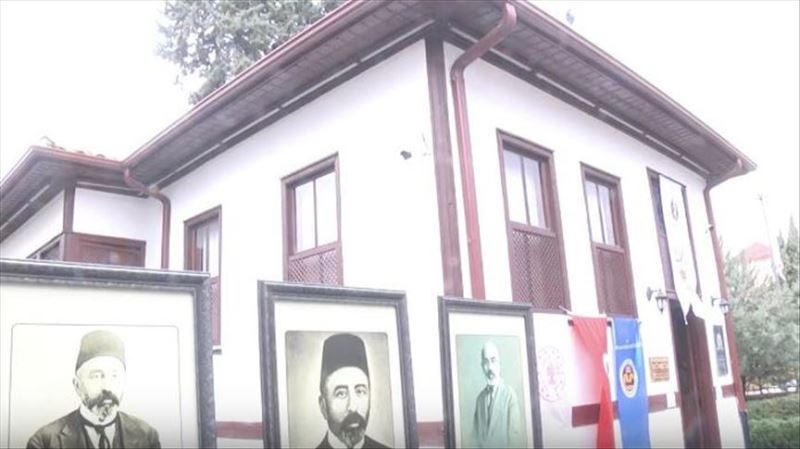Mehmet Akif Ersoy's poetry not limited to national borders, appeals to entire Muslim world, says expert
Mehmet Akif Ersoy, the revered Turkish poet and the author of the Turkish national anthem, still shines a light for the entire Muslim world 83 years after his demise.
Ersoy became one of the most well-known figures in Turkish literature worldwide in early 1900s, Necmettin Turinay, teaching at TOBB University of Economics and Technology in the capital Ankara, told Anadolu Agency.
Turinay, an expert on Ersoy's literary works and currently working on the latest edition of Ersoy's 1911 work entitled "Safahat", spoke to Anadolu Agency in an exclusive interview at the Museum House of Mehmet Akif Ersoy in Turkey's capital Ankara.
His famous work Safahat is a collection of 44 poems in various lengths, including Phases (1911), Lecturing at Suleymaniye (1912), Voices of God (1913), Lecturing at Fatih (1914), Memoirs (1917), Asim (1924), and Shadows (1933).
His poems were themed with social problems, philosophical, religious, political and ethical issues.

Ersoy's house, in one of Ankara’s older districts Altindag, was once used as a dervish convent. The "Selamlik" -- a part of a house only men can enter -- was assigned to Ersoy during the Turkish War of Independence.
Moving from Istanbul to Ankara to live in the dervish convent in 1920s, now converted into a museum, Ersoy arrived there during the most painful and troubled years of foreign occupation in the country, Turinay said.
Spiritual leader of Turkish national struggle
When Ersoy came to Ankara, the Turkish people had to achieve mainly two things to win the War of Independence, Turinay stressed.
The first was to form a new army as the Turkish armies were dissolved with the agreements of World War I, and the second was to encourage the people to join the national struggle with a hope for independence, he stressed.
During his speeches at various mosques of Central Anatolian cities, Ersoy gave voice to the faith and spirit necessary for the national struggle, Turinay added.
In 1920, Ersoy was also elected the deputy of the northwestern Burdur province and entered the parliament.
‘Free since beginning, to be so forever’
The dervish convent was also the place where Ersoy wrote the lyrics of Turkish National Anthem -- the March of Independence -- Turinay said.
On March 12, 1921, the Turkish Grand National Assembly officially declared Ersoy's poem as the national anthem.
In the march, Ersoy immortalized his nation's battle for survival, in the wake of World War I, crowning its national liberation in 1921 during the Turkish War of Independence against foreign occupation.
After World War I, the Ottoman Empire, one of the greatest empires in history, was destroyed.
The British, French and allied forces had shattered the Ottoman Empire, and every part of the country was in captivity.
Under those conditions, the national anthem's first words were “Fear not!”.
Ersoy began his poem with such a call to give hope to the Turkish and Muslim people against foreign occupation that they can regain their independence, he said.
“The Turkish nation has been free since the beginning of history,” said Turinay referring to the two verses of the anthem.
“I have been free since the beginning and forever will be so.”
What madman shall put me in chains! I defy the very idea!”
The phrase of “since the beginning” had special significance expressing that the Turkish people have always lived in independence, founding great empires, Turinay said.
Through these verses, Ersoy warned Turkish people that the negative conditions were temporary and urged to struggle together to overcome the captivity, Turinay added.
Universal character, historical depth of national anthem
Turinay stressed that the national anthem soon began to evoke significant repercussions in the Muslim and Turkic worlds in the wake of official recognition by the Turkish Parliament.
“The national anthem, 'the symbol of the Turkish nation', has a universal character appealing to both the Turkish and Islamic worlds,” he highlighted.
It was translated into the local languages of various countries, including Pakistan, Syria and Iraq, although the people of these countries were living under captivity of the French and British at that time.
“Ersoy, who depicted the most painful years of Turkey during World War I and Balkan Wars in his works, gained a high reputation within and outside of the Ottoman Empire," Turinay underlined.
He was a well known poet and author in a wide range of countries extending from Azerbaijan, Pakistan, India, Egypt, Syria, Iraq, North Africa, Crimea to Balkans, he added.
“Mehmet Akif’s understanding of poetry was not limited to our national borders, rather he addressed the whole Turkish and Muslim world,” Turinay stressed.
History through art, literature
Turinay described Ersoy as “one of the geniuses of Turkish poetry, and said: “If there is an awareness today in Turkey about World War I and the Battle of Canakkale [Gallipoli], thanks to Ersoy's poem To the Gallipoli Martyrs".
“Turkish people remember the pain, grief and destruction of these years through this poem,” he added.
Ersoy not only tells the pain and memory of the martyrs of Gallipoli with this poem, but he also describes the withdrawal of an empire from the stage of history and the closing of an era, Turinay stressed.
The Battle of Canakkale, which took place in the northwestern Turkish province of Canakkale's Gelibolu (Gallipoli) district in 1915, marked a turnaround in favor of the Turks against the Allied forces during World War I.
Tens of thousands of Turkish nationals and soldiers died, along with tens of thousands of Europeans, as well as around 7,000-8,000 Australians and nearly 3,000 New Zealanders, referred together as Anzac troops.
AA